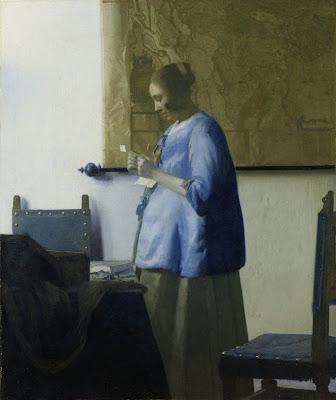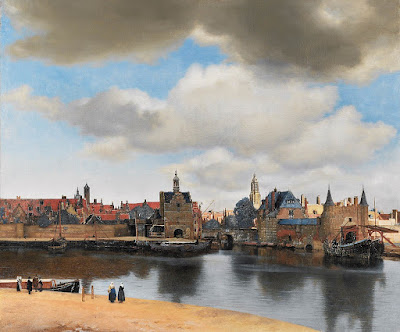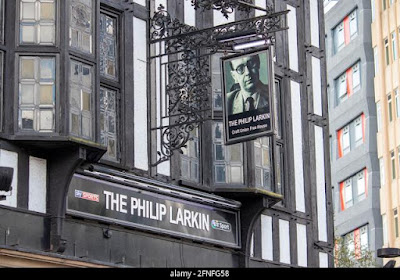Although the Lichfield house has thrown up problem after problem and become something of a money pit, the garden – a beautifully designed plot surrounded by fine trees and shrubs – has been an unalloyed delight. Part of the pleasure it affords – in addition to the beauty of its flowers and foliage, its butterflies and birds – is the sense it gives of the year passing, every month bringing its changes and something new to enjoy. A garden like this is a marker of time and a reminder of its passing, all in due season. In his poem 'Time and the Garden', Yvor Winters – born on this day in 1900 – touches on this theme, as the beauties of the garden 'advance in their due series, space The season'...
The spring has darkened with activity.
The future gathers in vine, bush, and tree:
Persimmon, walnut, loquat, fig, and grape,
Degrees and kinds of colour, taste, and shape.
These will advance in their due series, space
The season like a tranquil dwelling-place.
And yet excitement swells me, vein by vein:
I long to crowd the little garden, gain
Its sweetness in my hand and crush it small
And taste it in a moment, time and all!
These trees, whose slow growth measures off my years,
I would expand to greatness. No one hears,
And I am still retarded in duress!
And this is like that other restlessness
To seize the greatness not yet fairly earned,
One which the tougher poets have discerned—
Gascoigne, Ben Jonson, Greville, Raleigh, Donne,
Poets who wrote great poems, one by one,
And spaced by many years, each line an act
Through which few labor, which no men retract.
This passion is the scholar’s heritage,
The imposition of a busy age,
The passion to condense from book to book
Unbroken wisdom in a single look,
Though we know well that when this fix the head,
The mind’s immortal, but the man is dead.
Of course, 'Time and the Garden' is not really about a garden; garden poems rarely are. Consider, for example, perhaps the most famous of them all – Andrew Marvell's 'The Garden' –
How vainly men themselves amaze
To win the palm, the oak, or bays,
And their uncessant labours see
Crown’d from some single herb or tree,
Whose short and narrow verged shade
Does prudently their toils upbraid;
While all flow’rs and all trees do close
To weave the garlands of repose.
Fair Quiet, have I found thee here,
And Innocence, thy sister dear!
Mistaken long, I sought you then
In busy companies of men;
Your sacred plants, if here below,
Only among the plants will grow.
Society is all but rude,
To this delicious solitude.
No white nor red was ever seen
So am’rous as this lovely green.
Fond lovers, cruel as their flame,
Cut in these trees their mistress’ name;
Little, alas, they know or heed
How far these beauties hers exceed!
Fair trees! wheres’e’er your barks I wound,
No name shall but your own be found.
When we have run our passion’s heat,
Love hither makes his best retreat.
The gods, that mortal beauty chase,
Still in a tree did end their race:
Apollo hunted Daphne so,
Only that she might laurel grow;
And Pan did after Syrinx speed,
Not as a nymph, but for a reed.
What wond’rous life in this I lead!
Ripe apples drop about my head;
The luscious clusters of the vine
Upon my mouth do crush their wine;
The nectarine and curious peach
Into my hands themselves do reach;
Stumbling on melons as I pass,
Ensnar’d with flow’rs, I fall on grass.
Meanwhile the mind, from pleasure less,
Withdraws into its happiness;
The mind, that ocean where each kind
Does straight its own resemblance find,
Yet it creates, transcending these,
Far other worlds, and other seas;
Annihilating all that’s made
To a green thought in a green shade.
Here at the fountain’s sliding foot,
Or at some fruit tree’s mossy root,
Casting the body’s vest aside,
My soul into the boughs does glide;
There like a bird it sits and sings,
Then whets, and combs its silver wings;
And, till prepar’d for longer flight,
Waves in its plumes the various light.
Such was that happy garden-state,
While man there walk’d without a mate;
After a place so pure and sweet,
What other help could yet be meet!
But ’twas beyond a mortal’s share
To wander solitary there:
Two paradises ’twere in one
To live in paradise alone.
How well the skillful gard’ner drew
Of flow’rs and herbs this dial new,
Where from above the milder sun
Does through a fragrant zodiac run;
And as it works, th’ industrious bee
Computes its time as well as we.
How could such sweet and wholesome hours
Be reckon’d but with herbs and flow’rs!
In Marvell's poem, the garden is, for all its luxuriant detail, an idealised ground against which the poet dramatises his longing for solitude and transcendence, but his flights of fancy end in the real world of passing time, now sweetened by the fragrant beauties of the garden. And meanwhile my own garden lies bathed in soft autumn sunshine, and leaves drift down from the ash trees and the rowan.





